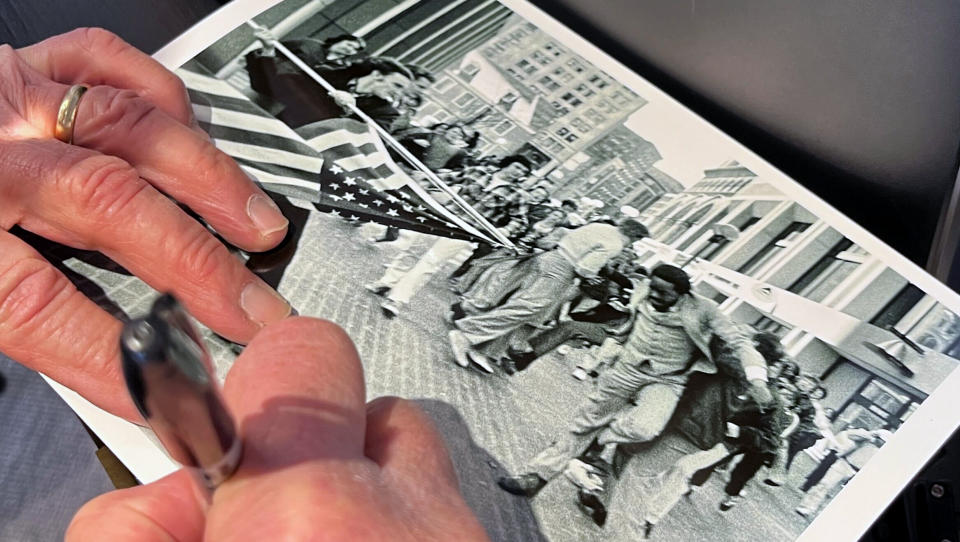It’s been nearly 50 years since the award-winning image “The Soiling of Old Glory” was taken at Boston’s City Hall Plaza. The photo depicts a young white man holding an American flag like a spear, pointed at a young Black man during a desegregation protest in Boston, and captured the nation’s attention with how it captured the racial violence of the 1970s busing crisis.
“What the photo did was to force Bostonians from the region, to hold a mirror up to themselves and to ask themselves, ‘How it was that this horrible thing could have happened to an innocent person who hadn't provoked anything?’” said Theodore “Ted” Landsmark, the Black man captured in the photograph. “And what it meant, for their own sense of conscience that things had gone to that level.”
On that day, April 5, 1976, Landsmark said he was running late to a meeting at City Hall and wasn’t paying attention to his surroundings when he found himself surrounded by desegregation protesters.
“The whole incident took no more than probably eight or 10 seconds,” Landsmark said.
But photographer Stanley Forman was there with his camera.
Landsmark and Forman, who won a Pulitzer Prize for the image, spoke at an event Tuesday about what the photo means in 2024. The event, hosted by the law firm Foley Hoag in the Seaport, is part of a larger commemoration of the 50th anniversary of the watershed civil rights decision that ordered Boston Public Schools to desegregate, Morgan v. Hennigan.
Forman clicked through the violent images of that day on a slideshow in front of a rapt audience of employees of the firm — some of whom said later that they’d never seen the original image before. Another image in the series shows Landsmark in a suit, taken back by a blow from a white man.
“I actually hate looking at these,” Forman said.
Forman himself grew up in Revere. “I don't think it was racist,” he said of his upbringing. “But I was not a person who was being attacked.
“I’m just amazed when I look at the pictures how much hate there was,” he added.

Landsmark grew up in New York in a family very involved in civil rights and social justice activism — he’d seen Martin Luther King Jr. speak multiple times, attended the March on Washington and had been to Selma.
“In a lot of ironic respects, the kids really chose the wrong guy to attack,” he said jokingly.
While Landsmark is grateful for the positive impacts the image has made, he continues to see the harmful effects that endemic racism has today, a half century later.
“The issues of access to finance, economic development, small business development and access to vocational schools. All of that stuff continues at this moment," he said.
“What the photo does, I think better than lots of other catalysts for conversation, is to get people to talk about those issues,” Landsmark added.
Now a professor at Northeastern, Landsmark said when students see the photo, they’re often “shocked and disappointed.” But many also look at it as inspiration to work on issues of social justice.
“I am inspired by the young people who are coming forward to address those issues in very pragmatic ways and very strategically and intentionally,” he told GBH News. “I have great hope that the generations that are now becoming involved with issues of social justice will have terrific success in moving forward with an agenda of fairness and access and opportunity.”





